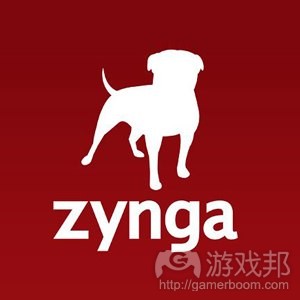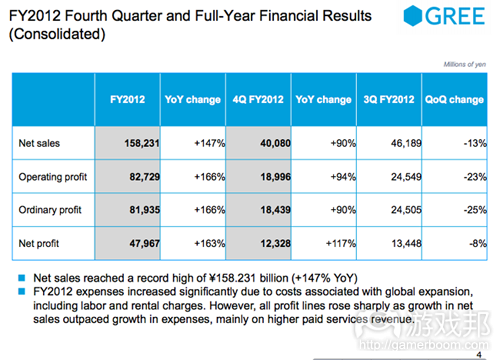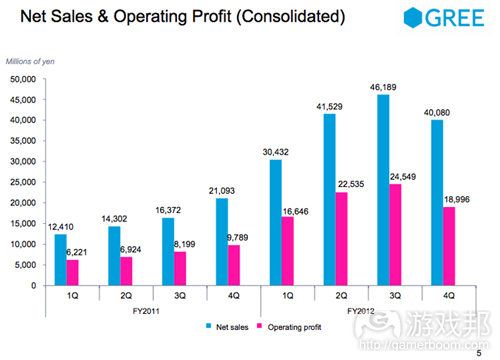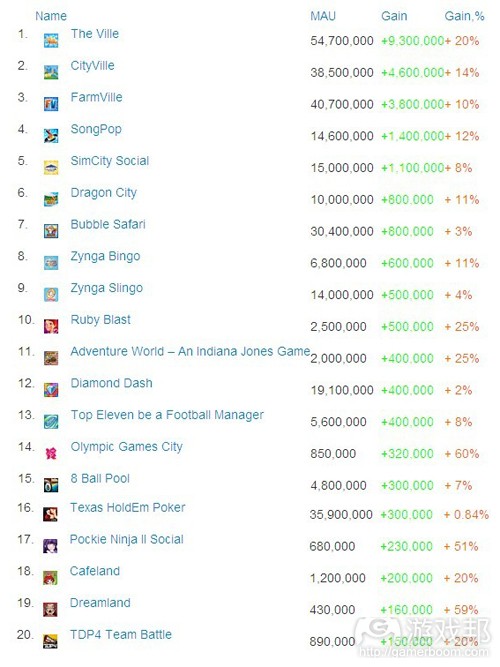每日观察:关注Zynga新游戏项目“CoasterVille”(8.15)
1)据gamezebo报道,最近有Facebook游戏玩家发现自己的工具条上出现一款名为“CoasterVille”的过山车游戏广告,该广告上还有Zynga标志。
用户若点击该广告则会进入一个问卷调查页面,其中问题包括:
*你会尝试一款名为《CoasterVille》的Facebook新游戏吗?
*请说明为什么会玩或不会玩这款游戏(请具体说明)。
*如果只根据游戏名称来选择,你更想尝试Roller CoasterVille,Thrill Park和CoasterVille中的哪款游戏?
参与调查的用户可提交自己的邮箱地址并获得游戏上线通知。值得注意的是,用户若访问zyngacoasterville.com则将直接被导向Zynga.com网站,另外Zynga曾在早期推出另一款过山车游戏《Roller Coaster Kingdom》,但该游戏最后却以失败告终。
2)日本社交游戏公司GREE日前发布的2012财年第四季度(截止6月30日)报告显示,公司净销售额为400.8亿日元(5.086亿美元),同比上季度下滑13%;净利润为123亿日元(1.561亿美元),同比上季度下滑8%。
GREE公司整个2012财年净销售额为1582亿日元(20亿美元),低于第三季度预期的1600至1700亿日元。但净销售额仍创下公司历史记录,同比上年增长147%;GREE在2012财年净利润为479亿日元(6.078亿美元),与其预期的440-500亿日元(5.78-6.57亿美元)相当。
GREE之前几个季度销售额及收益均高于竞争对手DeNA,但在这一季度的销售额比DeNA低16.5个百分点,DeNA在这一时期销售额为476亿日元(6.09亿美元)。
但GREE在该季度的营业利润为189亿日元(2.398亿美元),略高于DeNA的184亿日元(2.334亿美元);此外,DeNA该时期净收益为100亿日元(1.271亿美元),仍比GREE低18.5个百分点。
CREE预计公司在2013财年的净销售额将达1950-2050亿日元(24-26亿美元),净收益为460-520亿日元(5.837-6.598亿美元)。
该公司公布这一财报后,其股票价格跌至1457日元(18.48美元),公司目前市值为3400亿日元(43亿美元),比今年2月份时的5786亿日元(76亿美元)下降了43.4%。
3)据games.com报道,Facebook在最近的德国Gamescom大会上宣布,今年5月发布的App Center提升了游戏及应用曝光度以及用户粘性。
其最新数据表明,在过去6个月中玩Facebook游戏的用户增长8.4%;在上个月有1.5亿人使用了App Center;通过App Center找到游戏的用户第二天重返游戏的概率比一般用户高35%,在一周内重返游戏的概率比一般用户高17%。
4)在日前的GDC欧洲大会上,Ngmoco项目经理Senta Jakobson在发言中表示,公司瑞典工作室目前已有14名成员,他们在探索团队组建方式的过程中发现,有许多研究表明人们享有控制工作环境的自主权时,更能发挥出色表现。
因此他们团队采用了这种让成员自主决定办公地点的方式,因此有时候仅有2名成员在办公室上班,而其他多数人都在不同地方办公,有时候却有多个人同时呆在办公室。这种非常规式还体现在其招聘过程中。例如,他们在招聘新员工时一般都会让6、7个成员投票决定是否让对方加入公司;此外还采用了Yamer、Google Talk异步沟通工具,并使用Google Hangouts以及Skype进行同步交流。
该公司每天上午都有10点钟开始的晨会,但成员可以通过视频工具参会;但面对面的会议仍然不可或缺,团队每隔三个月都会到瑞典斯德歌尔摩工作室上班一周并参加团队活动。
5)在本周MAU增长最快的Facebook游戏榜单上,Zynga旗下的Ville仍然稳居前三名,《The Ville》持续领先,新增930万MAU,增幅为20%;
《CityVille》位列第二,新增MAU为460万,增幅达14%;《FarmVille》排名第三,新增380万MAU,增幅为10%;FreshPlanet旗下游戏《SongPop》名列第四,新增140万MAU,增幅为12%;EA游戏《SimCity Social》新增110万MAU,增幅达8%。(本文为游戏邦/gamerboom.com编译,拒绝任何不保留版权的转载,如需转载请联系:游戏邦)
1)Is Zynga’s next game CoasterVille?
By Jim Squires
Eagle-eyed Facebook gamers may have noticed a surprising ad in their sidebar today for a game called CoasterVille. More surprising still was the “Zynga” logo emblazoned on the ad. Did Zynga slyly release a new game without making any sort of an announcement whatsoever? Not really – but it looks like it could be a hint of things to come.
Clicking on the ad takes Facebook users to a survey that asks a series of questions about whether or not the reader would be interested in a game about rollercoaster fun, and at the very bottom, a link to the Zynga Privacy Policy appears – so it seems legit.
The questions are as follows;
•How likely would you be to try a new Facebook game named CoasterVille?
•Please explain why you would be likely or not likely to play a game named CoasterVille. (Please be specific)
•Based on the name alone, which of the following Facebook games would you be the most likely to try? Roller CoasterVille, Thrill Park, or CoasterVille?
Similarly, we’ve seen ads for Thrill Park as well with an identical set of questions (though the name Thrill Park takes the place of CoasterVille). Survey takers can provide an email address to be notified when the game is available, so it looks like this one might be out of the “is it a good idea?” stage and more into the “what should we call it?” stage.
Also worth noting? Visiting the website zyngacoasterville.com takes you straight to zynga.com.
It’s surprising that Zynga would want to embark on another roller coaster adventure – especially in light of the fact that their earlier Roller Coaster Kingdom was a pretty big flop.
What say you? Are you excited about the prospect of doing loop-de-loops on Facebook?(source:gamezebo)
2)GREE’s net sales, income decline Q-over-Q to $508.6M and $156.1M on kompu gacha ban
Kathleen De Vere
GREE’s record 2012 has come to a sour end in the fourth quarter. According to the company’s Q4 2012 earnings report, net sales dropped 13 percent quarter-over-quarter to 40.08 billion yen ($508.6 million), and net profit declined 8 percent quarter-over-quarter to 12.3 billion yen ($156.1 million).
The company’s fourth quarter also tainted its year end results — GREE’s total net sales for the year came in at 158.2 billion yen ($2 billion), a figure that was short of the of the 160 to 170 billion yen the company forecast with its Q3 results in May. That said, GREE’s net sales for the year still reached a record high, and were up 147 percent year-over-year. GREE’s total net profit for the 2012 fiscal year was 47.9 billion yen ($607.8 million), right in line with GREE’s previous predictions of net income between 44 and 50 billion yen ($578 to $657 million).
GREE’s weaker-than-expected results also meant that its net sales for the quarter fell behind those reported by arch-rival DeNA. GREE had been reporting higher sales and income than DeNA for the past several quarters, but GREE’s net sales of 40.08 billion yen ($508.6 million) in the quarter ending June 30 were 16.5 percent lower than DeNA’s revenues of 47.6 billion yen ($609 million) in the same period.
While GREE’s sales were lower, the company still managed to beat DeNA on a profit-basis. During the quarter ending June 30, 2012, GREE reported an operating profit of 18.9 billion yen ($239.8 million), slightly higher than DeNA’s operating profit of 18.4 billion yen ($233.4 million). DeNA’s net income of 10 billion yen ($127.1 million) was also 18.5 percent lower than GREE’s during the period.
Overall however, GREE must be disappointed by the results. As you can see in the chart below, it was the first time since Q1 2011 that GREE had seen net sales and operating profit decline quarter-over-quarter.
GREE indicated its global expansion plans and its user environment improvement plans had led to a shortage of major IP titles and new games, which in turn contributed to the drop in sales and income. Like DeNA, GREE has recently introduced monthly purchase limits for underage players, introduced measures to prevent real money trading of its virtual goods and most importantly, begun phasing out kompu gacha. While GREE did not specifically disclose the impact of the kompu gacha ban on its results, it seems like that elimination of the lucrative mechanic was a significant contributing factor to the company’s drop in sales.
GREE also outlined its global expansion plans in today’s earnings report. For its North American, European and Asian markets, the company’s goal is to improve average revenue per daily active user (ARPDAU) to approximately $1 in its card battle games, and release more card-battle and simulation games. GREE did report its global net sales had increased in the fourth quarter, but did not provide firm numbers, or indicate what percentage of its global sales have come from its acquisition of Funzio. GREE was also tight-lipped about the growth of its global network and the performance of its games outside Japan.
Overall, GREE is predicting it will see net sales between 195 and 205 billion yen ($2.4 billion to $2.6 billion) during its 2013 fiscal year, and net income of 46 to 52 billion yen ($583.7 million to $659.8 million).
The company’s shares declined on the news, and are currently trading at 1,457 yen ($18.48). GREE currently has a market capitalization of 340 billion yen ($4.3 billion), down 43.4 percent from its February valuation of 578.6 billion yen ($7.6 billion).(source:insidemobileapps)
3)File this under ‘Duh’: Facebook App Center boosts game playing
by Libe Goad
Over the past few years, we’ve been dedicated to covering social games , and one of the major topic of conversations was this:
Facebook’s (formerly) pitiful excuse for a game hub. And while developers complained–loudly, I might add–about the lack of virality on Facebook, we’d just look at this page (above) and wonder, what is Facebook thinking? Is the social network too high on its horse to care about its games?
Then, in May, Facebook launched the App Center, a pretty decent games hub with links galore to both Facebook games as well as games on mobile. And this week at the Gamescom conference in Germany, it comes as no surprise that Facebook announces that the App Center is driving engagement to Facebook games.
Some of the more noteworthy stats are that people playing Facebook games have grown 8.4 percent in roughly the past six months. In the past month, 150 million people used the App Center, which has more than doubled the number of games played than the old games dashboard. Also, people who find a game through the App Center are 35 percent more likely on average to return the next day and 17 percent more likely to return in a week.
So, there you go: Give people a decent way to find games on your platform, and–ta-da! — they’re more likely to find and play games on your platform.(source:games)
4)GDCE 2012: ngmoco’s Senta Jakobsen on building a team when developers don’t come to the office
by Jon Jordan
Digging deeply into how game developers can or should work, ngmoco’s Senta Jakobsen gave a talk about setting up the company’s Stockholm studio.
Presenting her findings in a GDC Europe talk entitled ‘Building and working in a distributed team’, she said, “We wanted to stay as small as possible for as long as possible so we wanted experienced game developers; people who cared about the game as a whole and the studio.”
However, these people are hard to find, and even harder to relocated to another country.
Another way
So Jakobsen and Ben Cousins – who heads up the Swedish studio: now 14 people strong – started to research how they could build their team, reading motivational and organisational books such as The Starfish and the Spider and Why works sucks and how to fix it.
As they found, there’s a lot of research backing a view that people work best when they have personal control over their working environment.
“Work isn’t a place you go, it’s something you do,” Jakobsen argued.
The result was a ‘manifesto’ that stated people would be trusted to do their work, wherever they wanted to be in the world.
All together
This unconventional situation was mirrored in other employment-related decision making.
For example, hiring was informally with six or seven people involved with any one of them having the power to veto that person joining the company.
Similarly, the company spent a long time evaluating various communication tools, eventually settling on Yammer and Google Talk for asynchronous communication. Google Hangouts is used for synchronous communication, occasionally also Skype.
“We don’t really have meetings, but we meet,” Jakobsen said. “We don’t book an hour via Outlook. We have short ‘meetings’ whenever something comes up.”
Time for your close up
“You do have to think ahead a little more. You have to be more specific,” she said. One interesting point was how long it took people to stop asking for permission before they made a video call.
The company still has a 10am meeting every morning, with people attending via video wherever they are in the world, whether Sweden, Ukraine, Bulgaria, Germany, the Czech Republic or Japan.
Proof meets pudding
Face-to-face meeting are important, however.
Every three months, the team comes to the Stockholm office for a week of working in the office, which also involves a ‘team event’.
In conclusion, Jakobsen reckoned that people worked in much the same way as they would in an office, only they have far greater control over their own time, making them much happier, and hopefully resulting in a better game (as yet unannounced and unreleased). (source:pocketgamer)
5)The Ville once again on top of this week’s fastest-growing Facebook games by MAU
Mike Thompson
Author’s note: Zynga’s “Ville” games are still topping our gainer lists due to a spike in daily active users from the weekend of August 5, which was due to a bug on Facebook’s part. We’re in the process of addressing this issue with our AppData traffic tracking service and should have it resolved in time for our list of fastest-growing Facebook games by DAU on Wednesday.
Zynga’s The Ville continues to dominate our list of fastest-growing Facebook games by monthly active users, taking the top spot this week with 9.3 million MAU for a 20 percent gain.
CityVille came in at No. 2 with 4.6 million MAU, a 14 percent gain. FarmVille, in turn, took the No. 3 spot with 3.8 million for a 10 percent gain. FreshPlanet’s SongPop placed at No. 4 with 1.4 million MAU, up 12 percent. Finally, EA’s SimCity Social was up by 1.1 million MAU, an 8 percent gain that let it take the NO. 5 spot.
Three games this week showed traffic increases greater than 50 percent. LIFO Interactive’s Olympic Games City took in 320,000 MAU, a 60 percent gain. NGames Limited’s Pockie Ninja II Social was up by 51 percent with 230,000 MAU. Another FreshPlanet game, Dreamland, was up by 160,000 MAU for a 59 percent increase.(source:insidesocialgames)













































 闽公网安备35020302001549号
闽公网安备35020302001549号